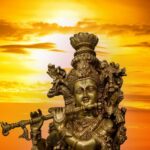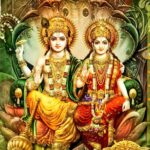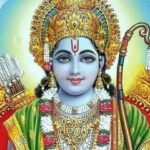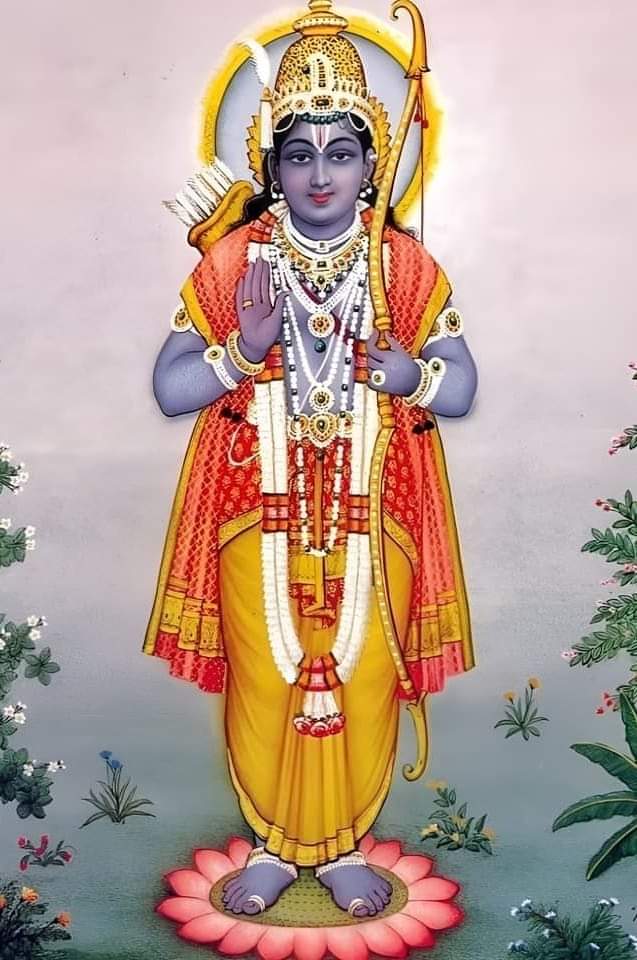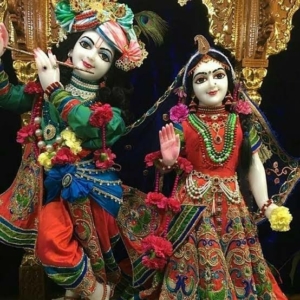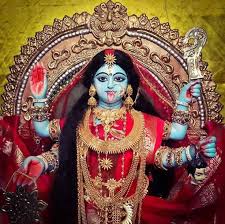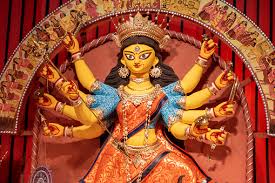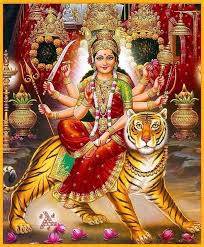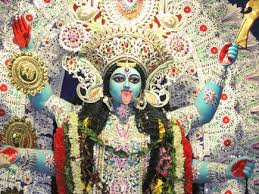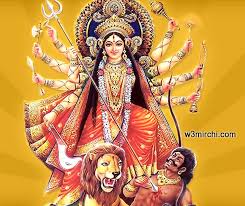कर्म और भाग्य में कौन महत्वपूर्ण है यह विषय हमेशा से ही विवादित रहा है। कोई भाग्य को बड़ा बताता है तो कोई कर्म को। गोस्वामी तुलसीदासजी ने भी रामचरितमानस में लिखा है-
कर्म प्रधान विश्व रचि राखा।
जो जस करे तो तस फल चाखा।।
जिससे यह प्रतीत होता है कि कर्म ही सबसे महत्वपूर्ण है। परन्तु रामचरितमानस में ही यह भी लिखा है-
होइह सोई जो राम रचि राखा।
को करि तरक बढ़ावे शाखा।।
अत: हम पुन: उसी स्थिति में आ गए कि हम किसका अनुसरण करें कर्म का अथवा भाग्य का। चलिए हम इस प्रश्न का उत्तर जानने का प्रयत्न करते हैं।
वास्तव में कर्म और भाग्य एक दूसरे से सर्वथा भिन्न नहीं हैं। ये परस्पर सम्बंधित हैं एवं इनके मध्य सम्बन्ध है क्रिया-प्रतिक्रिया का। अर्थात कर्म क्रिया है और भाग्य उसकी प्रतिक्रिया। इस सम्पूर्ण प्रकृति का परिचालन एक स्वत: संचालित प्रक्रिया के द्वारा होता है-
अन्नाद्भावन्ति भूतानि पार्जन्यादन्न सम्भवः।
यज्ञाद्भावन्ति पर्जन्या यज्ञह कर्मसमुद्भवः।।
अर्थात जीव अन्न से उत्पन्न होते हैं, अन्न वर्षा से होता है और वर्षा यज्ञ से होती है और यज्ञ कर्म से होते हैं।
जिस प्रकार हम किसी कार्य के लिए सॉफ्टवेयर का निर्माण कर उसे इंस्टाल करते हैं। उसके बाद सारी प्रकियाएं स्वत: संचालित होती हैं। उसी प्रकार ईश्वर ने इस प्रकृति के सञ्चालन के नियम निर्धारित किये हैं एवं सम्पूर्ण प्रकृति उन्ही के अनुसार स्वयं संचालित होती है।
जीवन एवं मृत्यु एक सतत प्रक्रिया है जो निरंतर चलती रहती है। जन्म से लेकर म्रत्यु पर्यंत मनुष्य जो भी कर्म या क्रिया करता है वे प्रतिक्रिया स्वरुप उसके भाग्य में परिणत हो जाती है। उसी के अनुसार आगामी जीवन में उसे अच्छे या बुरे फल प्राप्त होते हैं।
यहाँ यह विचारणीय है कि कई बार लोग आजीवन अच्छे कर्म करने के उपरांत भी दुःख भोगते हैं जबकि कुछ लोग बुरे कर्म करने के उपरांत भी सुखी जीवन व्यतीत करते हैं। इसके लिए पूर्व में बताया जा चुका है कि जिस प्रकार जीवन म्रत्यु सतत प्रक्रिया है उसी प्रकार कर्मफल भोग भी एक सतत प्रक्रिया है जो कि मनुष्य के पूर्व के समस्त जन्मों के कर्म पर आधारित है।
कर्मफल भोग का निर्धारण हम अपनी सुविधानुसार नहीं कर सकते कि कब हमें अच्छे कर्मों का फल भोगना है और कब बुरे कर्मों का। मनुष्य भाग्य का निर्धारण तीन प्रकार के कर्मों के आधार पर होता है-
संचित कर्म
हमारे पूर्व के समस्त जन्मों के संचित किये हुए कर्म इस श्रेणी में आते हैं। हमें अपने आगामी समस्त जन्मों में इन्ही कर्मों के फल का भोग करना है।
प्रारब्ध कर्म
पिछले अनेक जन्मों के कर्मफल मनुष्य एक ही जीवन में नहीं भोग सकता। अत: जो जन्म वह लेने जा रहा है उसके जन्म से पूर्व उसके संचित कर्मों का एक छोटा भाग उस जन्म में भोग हेतु निर्धारित किया जाता है, वही उसका प्रारब्ध कर्म है। जिसके अनुसार उसकी जाति, कुल, गोत्र, एवं उस जन्म के भाग्य का निर्धारण होता है।
क्रियमाण कर्म
जन्म के उपरांत वर्तमान में मनुष्य जो कर्म करता है वही उसका क्रियमाण कर्म है। जो आगे चलकर संचित कर्म में परिणत हो जाता है। संचित कर्म की यह विशेषता है कि इसके दो भाग होते हैं इसके एक भाग का फल इसी जीवन में भोगना पड़ता है दूसरा संचित कर्म में सम्मिलित हो जाता है।
जैसे यदि कोई व्यक्ति किसी की हत्या कर देता है तो उसका फल जेल जाने आदि अनेक कष्टों के रूप में तत्काल भोगना पड़ेगा। रामचरित मानस में एक कथा आती है कि जब इंद्र के पुत्र जयंत के द्वारा सीताजी के पैर में चोंच मारी गयी तो उसका फल अपनी एक आँख गवांकर उसे तत्काल भोगना पड़ा था-
निज कृत कर्म जनित फल पायहुँ।
अब प्रभु पाहि सरन तकि आयहुँ।।
अत: सर्वाधिक महत्वपूर्ण क्रियमाण कर्म ही हैं। जिसके द्वारा हम अपने प्रारब्ध में कुछ हद तक परिवर्तन कर सकते हैं। क्योंकि अनेक जन्मों के क्रियमाण कर्म ही संचित कर्म होते हैं। यदि संचित कर्मों में परिवर्तन होता है तो प्रारब्ध में भी निश्चित ही परिवर्तन होगा। क्योंकि प्रारब्ध का निर्माण भी संचित कर्मों के एक हिस्से से ही होता है।
अत: भाग्य को बदला जा सकता है। लेकिन यह आवश्यक नहीं है की मनुष्य कोई अच्छा कार्य करे और उसका फल तुरंत उसे मिल जाय। यह हो सकता है कि आपकी कर्मनिष्ठा, सतत सत्कर्मों में प्रवृत्ति एवं भक्ति से प्रसन्न होकर ईश्वर आपके कर्मभोग के चक्र को थोड़े समय के लिए शिथिल कर दें अथवा सांत्वना या पुरुस्कार स्वरूप कुछ अच्छे कर्मों के भोग को वरीयता प्रदान कर दें ।
परन्तु यह अटल सत्य है कि अपने कर्मों का सम्पूर्ण भोग आपको करना ही होगा। क्योंकि कर्म बंधन से तो स्वयं भगवान भी नहीं बच सके। गीता में भगवान् ने स्वयं कहा है-
न में पार्थास्ति कर्तव्यं त्रिषुलोकेषु किंचन।
नानवाप्तमवाप्तव्यं वर्तएव च कर्माणि।।
हे पार्थ तीनों लोकों में मेरे द्वारा करने लायक कुछ भी नहीं है फिर भी मैं कर्म में प्रवृत्त होता हूँ।
अत: प्रकृति में कोई भी कर्म बंधन से परे नहीं है। बिना कर्म किये कोई एक क्षण भी नहीं रह सकता है। गीता में ही कहा गया है-
नहि कश्चितक्षणमपि जाततिष्ठट्य कर्मकृत।
कार्यतेह्यवशः कर्म सर्व: प्रकृतिजैगुणै:।।
अर्थात बिना कर्म किये कोई एक क्षण भी नहीं रह सकता है, सभी प्रकृति से पैदा हुए गुणों से विवश होकर कर्म करते हैं।
अत: कर्मरत रहिये। सहज कर्म सदोष भी हो सकता है। परन्तु उसका उद्देश्य निर्मल होना चाहिए। भगवान् ने कहा है कि-
सहजम कर्म न कौन्तेय सदोषमपि न त्यजेत।
सर्वरम्भाहिदोषेण धूमेनाग्निरिवावृता।।
हे अर्जुन, दोषयुक्त होने पर भी सहज कर्म का त्याग नहीं करना चाहिए। क्योंकि जैसे अग्नि धुंए से आवृत्त होती है वैसे ही हर कर्म किसी न किसी दोष से युक्त होता है।
कर्म की महत्ता का प्रमाण इससे अधिक क्या हो सकता है-
काहू न कोऊ सुख दुख कर दाता।
निजकृत कर्म भोग सब भ्राता।।
अत: वर्तमान के कर्म ही हमारे भाग्य का निर्माण करते हैं। सो सत्कर्म में रत रहिये और अपना भाग्य बदलिये।
कबीरदास जी कहते हैं कि –
कर्म की गठरी लाद के जग में फिरे इंसान,
जैसा करे वैसा भरे, विधि का यही विधान।
कर्म करे किस्मत बने जीवन का ये मर्म,
प्राणी तेरे भाग्य में, तेरा अपना कर्म।
परमात्मा कभी किसी का भाग्य नहीं लिखता। जीवन के हर कदम पर हमारी सोच और विचार, हमारे अच्छे और बुरे कर्म, ही हमारा भाग्य लिखते हैं।
कौन कहता है कि इंसान खाली हाथ आता है और खाली हाथ जाता है। ऐसा नहीं है,
इंसान भाग्य लेकर आता है और कर्म लेकर जाता है।
भाग्य के अधीन निश्चिंत रहना अकर्मण्यता है… क्योंकि… भाग्य का ताला कर्म की चाबी के बिना नहीं खुलता।
The topic of who is important in karma and destiny has always been controversial. Some give importance to luck and some to karma. Goswami Tulsidasji has also written in Ramcharitmanas- Karma Pradhan created the world. Whatever you do, you taste the fruit.
Due to which it seems that karma is the most important thing. But it is also written in Ramcharitmanas itself- Hoih soi jo Ram rachi rakha. Increase the branch by doing it.
So, we are again in the same situation that whom should we follow, karma or destiny. Let us try to know the answer of this question.
In fact, karma and fate are not at all different from each other. They are interrelated and there is a relation between them of action-reaction. That means karma is action and destiny is its reaction. The operation of this entire nature is done by an automatically operated process-
Beings are created from food, and food is not possible from rain. From sacrifice arise the rains, and sacrifice is the source of action.
That is, living beings are born from food, food is from rain and rain is from sacrifice and sacrifice is from karma.
The way we build and install software for any work. After that all the processes are operated automatically. Similarly, God has set the rules of operation of this nature and the whole nature operates itself according to them.
Life and death is a continuous process which goes on continuously. Whatever action or action a man does from birth till death, it turns into his fate as a reaction. According to that he gets good or bad results in the next life.
It is worth considering here that many times people suffer pain even after doing good deeds throughout their life while some people live a happy life even after doing bad deeds. For this, it has been told in the past that just as life and death are a continuous process, in the same way, the enjoyment of the fruits of action is also a continuous process, which is based on the deeds of all the previous births of a man.
We cannot decide according to our convenience that when we have to enjoy the fruits of good deeds and when of bad deeds. Man’s fate is determined on the basis of three types of deeds-
accumulated karma The accumulated karma of all our previous lives comes under this category. We have to enjoy the fruits of these deeds in all our future births.
Predestined Karma Man cannot experience the fruits of his actions in many previous births in a single life. Therefore, before the birth that he is going to take, a small part of his accumulated Karma is determined to be enjoyed in that birth, that is his Prarabdha Karma. According to which his caste, clan, gotra, and the fate of that birth is determined.
action verb After birth, the work that a man does in the present is his actionable action. Which later turns into Sanchit Karma. The specialty of Sanchit Karma is that it has two parts, the fruits of one part of it have to be experienced in this life, the other part is included in Sanchit Karma.
For example, if a person kills someone, then he will have to suffer the consequences immediately in the form of going to jail etc. There is a story in Ramcharit Manas that when Indra’s son Jayant bit Sitaji’s feet, he had to bear the consequences by losing one of his eyes.
I received the fruits of my own deeds. Now, Lord, I have come to take refuge in you.
Therefore, the most important action is action. Through which we can change our destiny to some extent. Because the actions of many births are the accumulated actions. If there is a change in the accumulated deeds, then definitely there will be a change in the destiny. Because destiny is also created from a part of the accumulated deeds.
So luck can be changed. But it is not necessary that a man should do a good deed and get its result immediately. It may happen that being pleased with your devotion to duty, tendency and devotion in continuous good deeds, God relaxes the cycle of your suffering for a short time or gives preference to the enjoyment of some good deeds as a consolation or reward. But it is an unchanging truth that you will have to fully enjoy your deeds. Because even God himself could not escape from the bondage of karma. The Lord Himself has said in the Gita-
I have nothing to do in the three worlds, O Partha. What is not attained is not to be attained and actions are present.
O Partha, there is nothing to be done by me in the three worlds, yet I engage in action.
Therefore, no action in nature is beyond bondage. No one can live even for a moment without doing work. It has been said in the Gita itself-
No one has been born and stood for a moment and has done the deed. All action is done under the control of the modes of nature.
That is, no one can live even for a moment without doing work, everyone works by being constrained by the qualities born of nature.
So keep working. Spontaneous actions can also be flawed. But his aim should be pure. God has said that-
One should not abandon instinctive action, O Kaunteya, even if it is faulty. It was like a fire covered with smoke by the fault of the serpent in all its beginnings
O Arjuna, one should not give up one’s instincts even if one is guilty. Because just as fire is covered by smoke, similarly every action is covered with some defect or the other.
What can be more proof of the importance of Karma than this?
Why don’t you give happiness and sorrow to someone. All brothers enjoy personal deeds.
Therefore, only the deeds of the present create our destiny. So stay engaged in good deeds and change your destiny.
Kabirdas ji says that – Human beings wandered in the world carrying the bundle of karma, Fill as you do, this is the rule of law. This is the heart of life, let karma become luck, Creature in your destiny, your own karma.
God never writes anyone’s fate. At every step of life, our thinking and thoughts, our good and bad deeds, only write our destiny.
Who says that man comes empty handed and goes empty handed. It’s not like that, Man comes with luck and goes with karma.
It is inaction to remain relaxed under destiny… because… the lock of destiny does not open without the key of karma.



